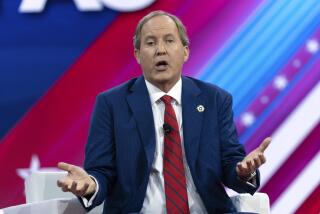Birthright citizenship is settled law
As an attorney and supporter of immigrant rights, I tried to read with an open mind Charlotte Allen’s Sept. 20 Times Op-Ed article, “A birthright that shouldn’t be.” Allen argued against the 14th Amendment’s provision of birthright citizenship, warned of the costs associated with U.S.-born children of undocumented workers and castigated the Obama administration for failing to secure our borders.
The most meaningful part of her essay was what she did not say. Out of more than 1,000 words, she devoted exactly two sentences to offering a solution to our immigration problems.
Allen began by noting that if we ended birthright citizenship, “it would bring America’s citizenship policies into line with those of most of the rest of the world.” Sorry, but my mother never bought the “all the other kids are doing it” argument, and neither do I. The U.S. is the gold standard for the rest of the world, not the other way around. I’d prefer to keep things that way.
Allen admitted she has problems with the 14th Amendment, which she termed “an anachronism.” She suggested that it was devised solely to ensure that newly freed slaves were given their full rights after the Civil War. This is only partially true. The drafters of the amendment were equally concerned with the possibility of a two-tiered system for those born on American soil. They carved out exemptions from birthright citizenship for children of diplomats and invading armies. They could have easily made an exception for parents who were not in the country legally, but they did not.
I have to add that, to me, our constitutional amendments are not an a la carte menu. I find it troubling that Allen would pick and choose only those that she likes and discard others.
Allen cited the 1898 Wong Kim Ark case in the Supreme Court without putting it in context of established legal precedent. Yes, some have argued that illegal immigrants are “not subject to the jurisdiction thereof” of the United States. However, the Supreme Court has ruled against these “distinguished legal scholars.” As recently as 1982, in Plyler vs. Doe, the court rejected the “not subject to the jurisdiction thereof” argument in favor of a test based on physical presence. From Wong Kim Ark to Plyler, there is nearly a century’s worth of settled case law affirming birthright citizenship
“How about enforcing the immigration laws we’ve got?” Allen asks. We’re already doing that. On June 19, the New York Times noted that “manpower and technology are at unprecedented levels at the border.” According to the Department of Homeland Security, in 2009 the U.S. deported 393,000 undocumented immigrants, the seventh consecutive record high. The nonpartisan Pew Hispanic Center reported this month that illegal immigration is down.
Nonetheless, Allen reserved harsh criticism for the Obama administration, which she accused of “doing everything in its power to ensure that these numbers [of illegal immigrants] continue to rise.” Really? President Obama has not pushed for amnesty. He favors comprehensive reform, but so far little has been done toward achieving this goal.
By focusing on the children of illegal immigrants, Allen fails to grasp the bigger picture. Undocumented workers do not come here to have kids; they come here to work. The magnet is jobs. Ironically, ending birthright citizenship would dramatically increase the size of our illegal population because more and more babies would be born lacking papers, creating a new, long-term class of undocumented people. Only comprehensive reform, including a pathway to citizenship for those already here, can move us forward.
While Allen referred to polls showing that voters are angry about illegal immigration, consider this: Numerous polls have consistently shown that Americans favor providing undocumented immigrants a way to gain legal status. A recent ABC News poll found that 57% support giving illegal immigrants the right to live here legally if they pay a fine and meet other requirements.
Allen recommended only one possible fix for our immigration system: E-verify, an Internet-based system for checking job applicants’ legal employment status. Yet a report commissioned by the U.S. Citizenship and Immigration Service that was released in January found that E-verify had serious flaws. While it authorized 93% of legal workers to work, it also cleared roughly half of all unauthorized workers too. So as it turns out, my worst suspicions were confirmed: Like so many others in the anti-immigrant crowd, Allen is long on rhetoric and short on ideas.
Finally, I was dismayed by Allen’s biography, in which states that she is “a daughter of a legal Latino immigrant.” I understand why she might note her heritage, to preclude charges of insensitivity or racism. But why mention her parents’ immigration status? How sad that Allen seems to have missed out on one of the core values of our country — in the United States, we are all born equal, and it doesn’t matter who your parents are.
Raul A. Reyes is an attorney living in New York City.


